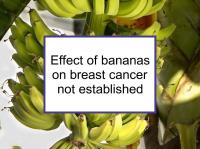Bananas (typically, Musa acuminata) are a good dietary source of potassium and vitamin B6. Bananas also contain some alpha-carotene, beta-carotene, fiber and manganese. Bananas have some anti-inflammatory, antimicrobial, neuroprotective and antioxidant activities. Bananas appear to protect the stomach lining against acid and ulcers.
Bananas have been shown to reduce blood pressure and the risk of coronary heart disease. Mice fed bananas were found to have lowered development of malignant ascites induced by Erhlich carcinoma cells in one study. Consumption of bananas has been found to be associated with reduced risks of glioma and childhood leukemia, as well as oral, esophageal, renal cell and colorectal cancer.
Breast cancer-related effects of eating bananas
One 2022 study found that banana extract induced programmed cell death in triple negative (ER-/PR-/HER2-) breast cancer cells. A large U.S. prospective study reported that adolescents with high banana intake had reduced risk of breast cancer in adulthood. One 2009 study of Chinese women found that banana consumption was associated with lower risk of breast cancer. As noted above, bananas are a good source of vitamin B6, which has been reported in some studies to be inversely associated with breast cancer risk.
It is evident that bananas do not promote cancer and appear to have anti-cancer properties. However, the anticancer activities are not fully explained by what is known of banana nutrients. Bananas have among the lowest levels of antioxidant activity of any fruit as measured by traditional methods. The chemopreventive micronutrient content of bananas is also modest compared to almost all other fruits, including plantains.
Additional comments
Using bananas in fruit smoothies has the potential to greatly reduce the bioavailability of beneficial fruit flavanols, and most likely other dietary polyphenols, according to one 2023 study. This is the result of banana's polyphenol oxidase (which causes browning of fruit) content.
Although edible, unripe or green bananas are usually cooked, whereas ripe bananas are normally eaten raw. Green bananas have lower sugar content than ripe bananas. Very ripe bananas have the least fiber and highest glycemic index.
Sources of information provided in this webpage
The information above, which is updated continually as new research becomes available, has been developed based solely on the results of academic studies. Clicking on any of the underlined terms will take you to its tag or webpage, which contain more extensive information.
Note that while we are continually searching for new evidence concerning this food, there is not much interest in it among cancer researchers so few recent studies are available.
